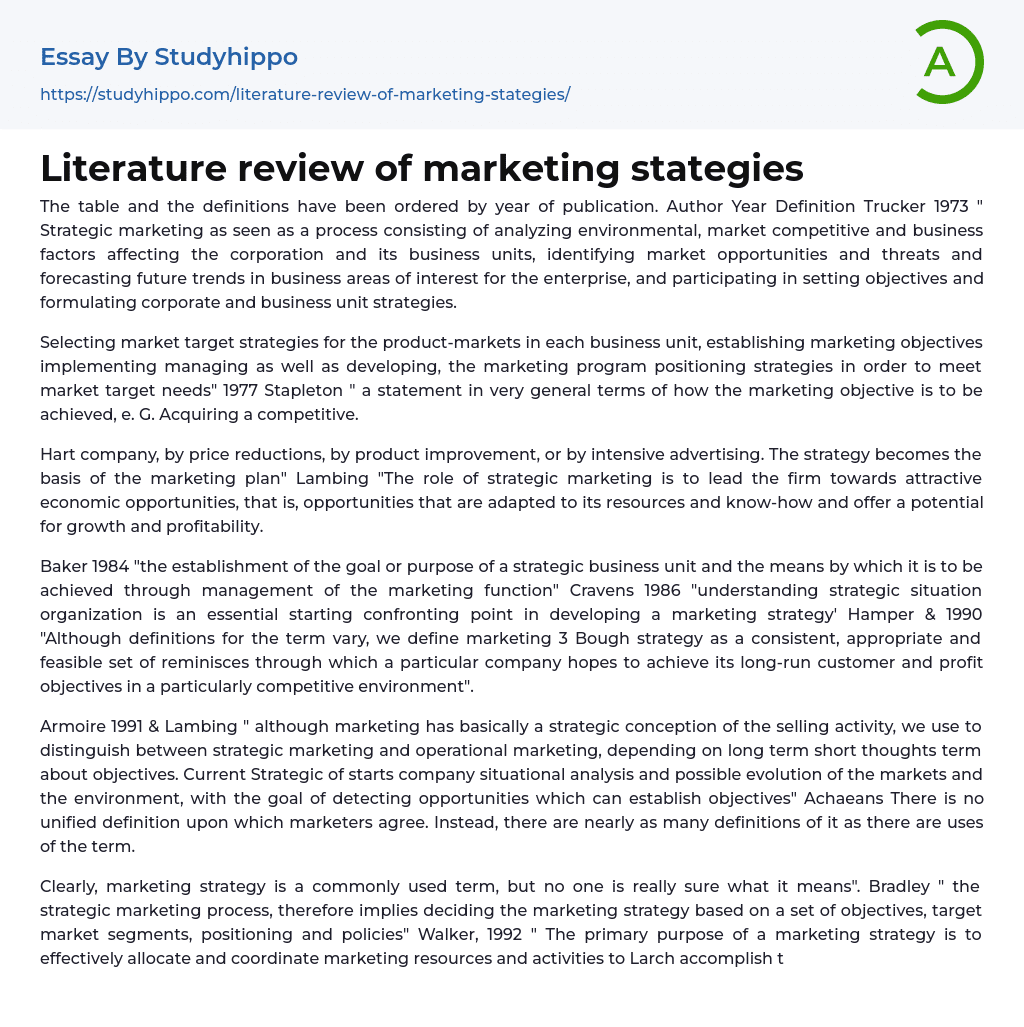The table and definitions have been arranged in chronological order of publication. Author Year Definition Trucker 1973 states that strategic marketing is a process that involves analyzing environmental, market competitive, and business factors that impact the corporation and its business units. It also involves identifying market opportunities and threats, forecasting future trends in business areas of interest for the enterprise, and participating in setting objectives and formulating corporate and business unit strategies.
In 1977, Stapleton outlined the importance of selecting market target strategies for each business unit's product-markets. This involves establishing marketing objectives, implementing and managing the marketing program, and developing positioning strategies to meet the needs of the target market. The ultimate goal is to acquire a competitive advantage.
Hart company can guide the firm towards attractive economic opportun
...ities by implementing strategies such as price reductions, product improvement, or intensive advertising. This strategy serves as the foundation for their marketing plan as it allows them to capitalize on opportunities that align with their resources and expertise, ultimately resulting in growth and profitability.
According to Baker (1984), the establishment of the goal or purpose of a strategic business unit and the means by which it is to be achieved through management of the marketing function is crucial. Similarly, Cravens (1986) suggests that understanding the strategic situation of an organization is an essential starting point in developing a marketing strategy. Hamper et al. (1990) define marketing strategy as a consistent, appropriate, and feasible set of actions that a particular company hopes to undertake to achieve its long-run customer and profit objectives in a competitive environment.
Armoire 1991 ; Lambing state that marketing can be divided
into strategic marketing and operational marketing. Strategic marketing involves long-term planning and analysis of the market and environment to identify opportunities and set objectives. On the other hand, operational marketing focuses on short-term thoughts and objectives. However, there is no unified definition of marketing agreed upon by all marketers. Definitions of marketing vary depending on how the term is used.
The meaning of the term "marketing strategy" is unclear, although it is commonly used. According to Bradley (1992), the strategic marketing process involves determining the marketing strategy based on objectives, target market segments, positioning, and policies. The main goal of a marketing strategy is to allocate and coordinate marketing resources and activities to achieve the firm's objectives within a specific timeframe. Therefore, decisions about the scope of a marketing strategy include selecting the target-market segment(s) and product line.
Firms aim to gain a competitive advantage and synergy by planning a comprehensive marketing mix program. According to the 1993 "Gain" marketing strategy, it is primarily influenced by marketing objectives, customer perspective, competitive product/market momentum perspective, and past performance extrapolation to shape the foundation of marketing strategy. Marketing strategy is created at the business unit level and revolves around the interplay of three forces: the Customer, the Competition, and the Corporation.
A good marketing strategy should encompass a clear market definition, aligning corporate strengths with market needs, and achieving superior performance compared to competitors in key success factors. Marketing strategy is defined as a corporation's effort to differentiate itself from competitors, leveraging its relative strengths to better fulfill customer needs in a specific environment. The formation of marketing strategy is influenced by the interaction of the three
strategic constituents and involves four decisions.
- American Literature essays
- Between The World and Me essays
- Book Report essays
- Book Review essays
- Book Summary essays
- Books essays
- Character essays
- Coming of Age essays
- Dante's Inferno essays
- Everyday Use essays
- Flowers for Algernon essays
- Genre essays
- Greek Mythology essays
- Incidents in The Life of a Slave Girl essays
- Letter essays
- Literary Criticism essays
- Literary devices essays
- Literature Review essays
- Metaphor essays
- Myth essays
- Play essays
- Plot essays
- Poem essays
- Poetry Analysis essays
- Protagonist essays
- Reader essays
- Reason essays
- Rhetoric essays
- Rhetorical Question essays
- Rhyme essays
- Simile essays
- Tragic Hero essays
- Translation essays
- Understanding essays
- Utopia essays
- Villain essays
- Writer essays
- Advertisement essays
- Advertising essays
- Anheuser-busch essays
- Audience Theory essays
- Brand essays
- Brands essays
- Competitor Analysis essays
- Consumer essays
- Detergent essays
- Marketing Management essays
- Marketing Mix essays
- Marketing Plan essays
- Marketing Research essays




